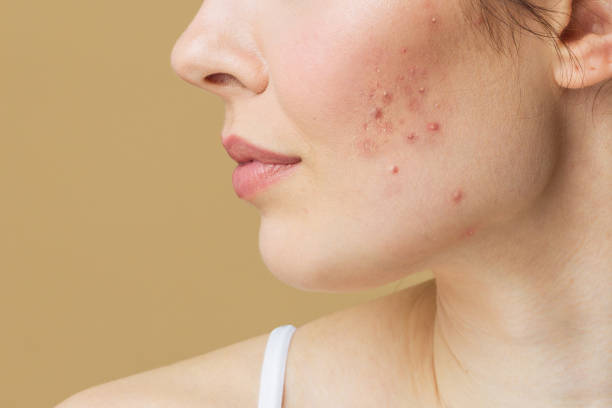Are you dealing with postpartum acne? If so, you’re not alone. Postpartum acne affects many new moms and can leave skin feeling irritated and blemished. Postpartum acne can happen due to hormonal changes that occur during pregnancy and after childbirth. During pregnancy, the body experiences a surge in hormones such as estrogen and progesterone, which can lead to an increase in oil production in the skin. After childbirth, these hormone levels drop rapidly, leading to a decrease in oil production, which can cause the skin to become dry and irritated. This can cause acne to flare up as the skin tries to adjust to the new hormone levels. Additionally, the stress and lack of sleep that often accompany having a new baby can also contribute to the development of postpartum acne.
Fortunately, there are several simple steps you can take to minimize postpartum acne and keep your skin looking its best. In this blog post, we’ll explore eight tips for reducing postpartum acne. So if you’re ready to get rid of postpartum acne, keep reading to learn more!
1) Keep your skin clean

Taking care of your skin is especially important after giving birth since hormones can cause acne and other skin issues. Keeping your skin clean is the best way to start tackling postpartum acne. First, make sure you’re using a gentle cleanser that won’t strip away natural oils from your skin. Cleansing twice a day, once in the morning and once at night before bed, is also recommended. When washing your face, be gentle and use lukewarm water (never hot water). Additionally, be sure to use a soft towel or cloth to pat your face dry.
Salicylic acid cleansers are beneficial in managing breakouts. Salicylic acid is a type of beta hydroxy acid (BHA) that can help unclog pores and reduce inflammation. A salicylic acid cleanser can be used daily to cleanse the skin and help prevent breakouts.
2) Exfoliate regularly

Exfoliation is an important step in helping to reduce postpartum acne. It helps to remove dead skin cells and excess oils that can accumulate and clog pores, leading to breakouts. Regular exfoliation helps to keep your skin clear and healthy looking.
For postpartum acne, it is generally recommended to use a chemical exfoliant instead of a physical one. Physical exfoliants, such as scrubs or facial brushes, can be harsh and abrasive on the skin, which can cause irritation and further breakouts. Chemical exfoliants use acids, such as alpha hydroxy acids or beta hydroxy acids, to dissolve dead skin cells. These can be more gentle than physical exfoliants, but they may still cause some irritation if used too often.
It’s important to limit how often you exfoliate and always make sure to follow up with a good moisturizer after exfoliating. You should aim for no more than twice a week and make sure to use a light hand when applying the exfoliant. This will help to prevent irritation and leave your skin feeling smooth and hydrated.
3) Use non-comedogenic products

Look for non-comedogenic (non-pore-clogging) products such as moisturizers, sunscreens, and makeup, that won’t clog your pores.
Skincare is personalized as everyone’s skin is different and what works for one person may not work for another. It’s important to listen to your skin and adjust your skincare routine as needed. Consult with a dermatologist if your postpartum acne persists or causes you distress, as they can recommend the best course of treatment for you.
4) Moisturising is important

For a few reasons, moisturizing is crucial in preventing postpartum acne.
- Hormonal changes: The body rapidly decreases estrogen and progesterone levels after childbirth, which might cause a reduction in oil production. Breakouts may result from the skin becoming dry and irritated as a result of this. The act of moisturizing keeps the skin moisturized and guards against dryness and irritability.
- Unclogs pores: Dry skin has a tendency to produce extra oil in an attempt to compensate, which can result in clogged pores and breakouts. Keeping the skin hydrated might aid in reducing oil production and maintaining clear pores.
- Reduces inflammation: Moisturizing can aid in reducing skin inflammation, which can aid in reducing acne-related redness and irritation.
- Promotes healing: Moisturizing can help to promote the healing of any existing acne and prevent post-inflammatory hyperpigmentation (PIH), which is a darkening of the skin that can occur after a breakout.
It’s important to look for a moisturizer that is non-comedogenic and formulated to not clog pores. This will help to keep the skin moisturized without contributing to the formation of new acne.
5) Use a face mask

Masks are excellent for treating postpartum acne. Any impurities that might be blocking your pores and resulting acne breakouts can be drawn out with their assistance. For effective acne treatment, look for face masks that have components like kaolin clay, activated charcoal, tea tree oil, and salicylic acid. After cleaning the skin, apply the face mask and keep it on for at least 15 minutes before rinsing. Consider applying a face mask once a week, or as often as necessary. You could discover that doing this lessens your postpartum acne.
6) Don’t pick at your skin

Picking at your skin is one of the worst things you can do if you have postpartum acne. While it may feel satisfying in the short term, it can often cause more harm than good in the long run. Not only can it lead to scarring and make your acne worse, but it also takes away from the healing process that your skin needs to get rid of acne.
It’s important to resist the urge to pick at your skin, no matter how tempting it may be. Whenever you feel the urge to pick at your skin, take a few deep breaths and remind yourself that you’re doing your skin a disservice by picking at it.
It’s also helpful to find other ways to distract yourself from picking. Try focusing on another task, going for a walk, or talking to a friend when you feel like you want to pick at your skin. Finding healthy and positive ways to cope with stress can also help reduce the urge to pick at your skin.
7) Get enough sleep and manage stress

For general health and well-being, getting enough sleep is crucial. Stress management techniques can also help postpartum acne look better. You can relax your body and mind by implementing some advice into your daily routine, which can help to lessen inflammation and enhance the general appearance of your skin.
Here are some suggestions for reducing stress and getting adequate sleep to help with postpartum acne:
- Prioritize sleep: Putting sleep first Sleep for 7-9 hours every night. Even on weekends, make an effort to maintain a regular sleep schedule to keep your body’s biological clock in check.
- Create a bedtime routine: Establish a habit before bed, such as reading or meditation, to assist your body to understand that it is time to unwind and sleep.
- Avoid engaging in stimulating activities for at least an hour before night. This includes using electronic devices, watching TV, or doing other stimulating activities.
- Practice stress-relieving activities: Schedule time for relaxation and stress-reduction activities like yoga, meditation, or exercise.
- Take a break: Throughout the day, be sure to take breaks to rest and refuel.
- Seek help if needed: If you are experiencing significant stress or difficulty sleeping, it’s important to seek help. Talk to your doctor, a therapist, or a counselor for support.
- Take care of yourself: Make sure you are eating a healthy diet, staying hydrated, and getting regular physical activity, as all of these can help to reduce stress and improve sleep.
8) See a dermatologist

If you are struggling with postpartum acne and haven’t been able to get it under control with any of the above methods, it is a good idea to consult a dermatologist. A professional can diagnose the type of acne you’re dealing with and provide tailored advice on how to effectively treat it. Your dermatologist can also provide medication that specifically targets acne and reduce inflammation. For example, they might prescribe topical retinoids, oral antibiotics, oral contraceptives, or spironolactone. You can also ask your doctor about laser treatments or light therapy if you are interested in those options.
It’s important to note that if you have sensitive skin, or if you’re breastfeeding, you should consult with a dermatologist before using any new skincare products and exfoliants, as some chemical exfoliants may be too harsh for you and may not be safe during breastfeeding.
Conclusion
Remember that when dealing with postpartum acne, it is important to be patient and consistent in your skincare routine. While results won’t come overnight, following the advice of a dermatologist and taking the time to nurture your skin can make a world of difference in improving your complexion.

Akanksha Sharma
Dr. Akanksha Sharma, Head Writer and creator of AtoZ of Pregnancy, is dedicated to empowering women, parents, and families through 360-degree knowledge. She and her team provide evidence-based advice to guide families through pregnancy, parenting and beyond.






